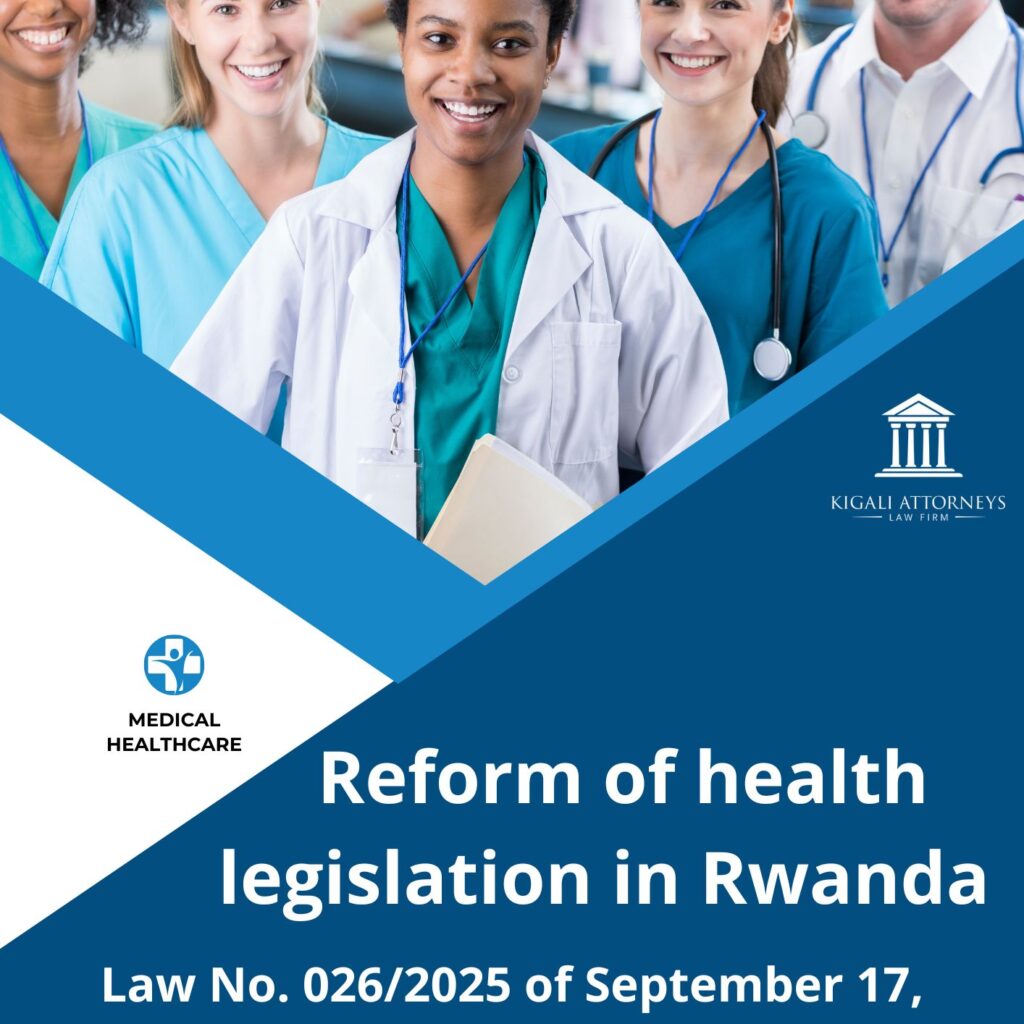Introduction
Health is a fundamental pillar of social and economic development for any country. In Rwanda, the desire to strengthen the healthcare system and guarantee citizens’ fundamental rights regarding health has led to a series of legislative reforms aimed at modernizing and adapting the legal framework to contemporary challenges. Among these initiatives, the enactment of Law No. 026/2025 of September 17, 2025, on the regulation of health care services, marks a significant milestone in the evolution of Rwandan health law. It comes in a context marked by the need to ensure equitable access to care, improve service quality, while respecting patients’ rights and integrating technological advancements.
This legislative reform is part of a broader dynamic of transforming the Rwandan health system, which has already achieved notable successes since the end of the 1994 genocide, notably through improved public health indicators and the establishment of modern infrastructure. However, many challenges remain, particularly concerning universal coverage, personal data protection, and accountability of health actors.
The adoption of Law No. 026/2025 of September 17, 2025, on the regulation of health care services, thus represents a key step in redefining the rights and duties of every sector stakeholder, while strengthening governance and transparency. It also paves the way for a new era where health rights will be better protected, and citizen engagement in public health management will be enhanced.
This analysis of the legislative reform will cover, among other things: its origins, its main provisions, its impacts on patients’ rights, as well as the challenges related to its implementation. It will also attempt to outline future prospects for the Rwandan health system in a constantly evolving context.
1. Historical and legislative context
a. Evolution of the legal framework of health in Rwanda
Since the end of the 1994 genocide, Rwanda has undertaken a profound reconstruction of its institutions, including the health sector. The need to guarantee universal access to quality care has led to the adoption of several legislative and regulatory texts aimed at structuring and strengthening the national health system. Among the early major laws are: Law No. 10/98 of October 28, 1998, on the practice of medicine; Law No. 49/2012 of January 22, 2013, on medical professional insurance; and Law No. 21/05/2016 of May 20, 2016, relating to human reproductive health, which laid the foundations for health regulation.
Over the years, these texts have been complemented by decrees, orders, and national strategies, notably the National Health Strategy 2012-2020 focused on improving access and quality of health care, based on decentralization, primary health care, and community participation, as well as strengthening human resources, which continues in the new National Health Professions Development Strategy (NSHPD) 2020-2030, and the promotion of an effective and accessible health system for all.
However, despite these advances, several challenges persist: regional disparities, weak financing, limited access in some rural areas, and insufficient legal protections for patients.
b. Limitations and challenges of the previous legal framework
The previous legal framework, although essential, showed its limitations in the face of the sector’s increasing complexity. Regulations sometimes lacked precision regarding the protection of patients’ rights, particularly concerning medical data confidentiality, informed consent, or recourse in case of disputes. Moreover, the absence of a clear legal framework for integrating new technologies, such as telemedicine, hampered innovation and service modernization.
Furthermore, governance of the sector remained challenged by issues related to transparency and accountability of actors, which undermined public trust in the health system. The need to adapt legislation to social, economic, and technological realities quickly became evident.
c. Motivations for the new reform
Faced with these challenges, the Rwandan government decided to undertake a comprehensive reform of its health legislation to better address 21st-century issues. Law No. 026/2025 of September 17, 2025, on the regulation of health care services, is part of a modernization and harmonization approach, integrating principles of human rights, data protection, and sustainable development. It also aims to align the national legal framework with Rwanda’s international commitments on human rights and universal health coverage.
Additionally, this reform is part of the implementation of Rwanda’s Vision 2050, which aspires to make the country a regional health hub, while guaranteeing every citizen the right to quality care. This law thus appears as a strategic lever to achieve these ambitious goals by providing a robust, coherent, and future-oriented legal framework.
2. Presentation of Law No. 026/2025 of September 17, 2025, on the regulation of health care services
a. Main objectives of the law
The reform of health legislation primarily aims to modernize, strengthen, and harmonize the legal framework of the health sector in Rwanda. It pursues several fundamental objectives: ensuring better protection of patients’ rights, enhancing governance and transparency in health, promoting universal access to care, and integrating technological advances into health service delivery.
In summary, this legislation seeks to establish a clear, fair, and contemporary regulatory environment while supporting the sustainable development of the Rwandan health system.
b. Key provisions
The law encompasses several major axes, summarized as follows:
– Protection of patients’ rights: The law establishes fundamental rights for patients, notably the right to information (Article 59), informed consent (Article 62), confidentiality, and remedies in case of harm. It also specifies the obligations of health professionals regarding ethics and deontology (Article 48 and following).
– Realization of digital health and medical technology (Article 37): Defined as the use of techniques, skills, and electronic devices in the delivery of health care services.
– Improved legal framework for medically assisted reproduction : Several provisions govern the preservation and use of gametes or embryos (Article 22), eligibility conditions (Article 23), requirements for recipients or donors of gametes or embryos (Articles 25 and 26), as well as obligations of a commissioning parent (Article 28) and a surrogate mother (Article 29).
3. Expected impacts of Law No. 026/2025 of September 17, 2025, on the regulation of health care services
a. Improvement of care quality
The adoption of this law is expected to have a significant effect on the quality of health services in Rwanda. By strengthening regulation and clearly defining the responsibilities of actors, the law should lead to better organization of health facilities, increased competence of health personnel, and greater compliance with international standards. The establishment of control and evaluation mechanisms will also ensure continuous quality improvement.
b. Reinforcement of patients’ rights protection
Through its provisions on fundamental rights protections, the law helps foster trust between users and the health system. Patients’ access to their medical data, ability to give informed consent, and access to remedies in case of harm constitute major advances for social justice and medical ethics.
c. Modernization of the health sector
The integration of new technologies, such as telemedicine, electronic health records, and digital health, positions Rwanda as a regional leader in digital health. This facilitates access to care in rural or isolated areas, reduces costs, and speeds up medical information exchange.
d. Better governance and transparency
By establishing a clear regulatory framework for governance and accountability of health actors, the law promotes more efficient and transparent management of health resources. This should strengthen citizens’ confidence in health institutions and attract investments in the sector.
e. Expansion of universal access to care
The law encourages the development of universal health insurance and diversification of funding sources, which should enable broader and more equitable coverage. Reducing regional and social disparities is a key goal to ensure every citizen can benefit from decent access to quality care.
4. Possible challenges and limitations
Despite many advantages, implementing Law No. 026/2025 may face some challenges, such as the need for adequate funding, personnel training, and infrastructure adaptation. Raising awareness and ensuring sector-wide ownership will also be crucial for the success of this reform.
5. Summary and future outlook
a. Reform assessment
Law No. 026/2025 on the regulation of health care services represents a major step in the development of Rwanda’s health sector. By consolidating the legal framework, integrating technological innovations, and strengthening patients’ rights protections, it paves the way for significant improvements in quality, governance, and access to care. The reform reflects the Rwandan government’s commitment to building a more equitable, efficient, and resilient health system.
b. Future prospects
To ensure the success of this reform, several actions are essential:
– Capacity building: Training and raising awareness among sector stakeholders, including health professionals, managers, and regulators.
– Resource mobilization: Securing adequate funding for implementing legislative provisions, especially in deploying digital technologies.
– Monitoring and evaluation: Establishing effective mechanisms to measure the law’s impact, identify obstacles, and adjust strategies accordingly.
– Citizen participation: Encouraging active involvement of users and communities in governance to ensure reforms genuinely meet their needs.
Conclusion
In summary, Law No. 026/2025 of September 17, 2025, on the regulation of health care services, represents a decisive step forward for the Rwandan health system. Its success will depend on the commitment of all actors, coherence in implementation, and the capacity to adapt actions to future challenges. It provides a solid foundation for achieving universal health goals while respecting every citizen’s fundamental rights.


